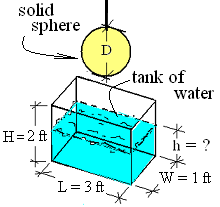| THERMO Spoken Here! ~ J. Pohl © | TOC NEXT ~ 67 |
Sphere, Tank and Water
 The sketch shows a heavy sphere suspended above a tank containing water with relevant dimensions. The diameter of the sphere is slightly less than one foot. As the sphere is lowered into the tank, the water surface rises to have a final depth of two feet. No water spills over. The mass of water in the tank initially equals that finally. (Take the density of water to be 62.4 lbm/ft3.)
The sketch shows a heavy sphere suspended above a tank containing water with relevant dimensions. The diameter of the sphere is slightly less than one foot. As the sphere is lowered into the tank, the water surface rises to have a final depth of two feet. No water spills over. The mass of water in the tank initially equals that finally. (Take the density of water to be 62.4 lbm/ft3.)
Calculate the mass of water in the tank.
♦ Since the final depth of water will be 2 feet, we conclude the sphere will be completely submerged. Neither the volume of the sphere nor that of the water changes. Hence the final volume, sphere and water taken together, will equal the sum of their initial volumes.
 |
(1)
The final volume equals the sum of the initial volumes. |
 |
(2)Here, “h” is the initial depth of the water in the tank. |
Thus the mass of water initially present is: m = ρ V:
 |
(3)Mass equals density times volume. |
Though we tend to take geometry for granted, it can become complicated for the novice.
Suppose the initial depth of water were 0.5 feet (that is, h = 0.5 ft). Were the sphere lowered into the tank, what final depth of the water would occur?
♦ Hoping this calculation is simple, we assume the sphere becomes completely submerged. That way the sum of the spherical and rectangular volumes will become a rectangular total. With that assumption, we calculate the second depth of water as a sum of the water in the tank initially and volume of the sphere (subject to our assumption).
 |
(4)
'CONTRADICTION: the calculated final depth,' |
A problem has arisen. We assumed complete submergence. The second depth determined (0.67ft) is less that the diameter of the sphere. Thus the sphere will not be completely submerged; our assumption was wrong. Our calculation must be recast to include a "cap" of the sphere extending above the water level. Do you know the volume of a spherical cap? Some tedious algebra will obtain an answer. We leave it here.